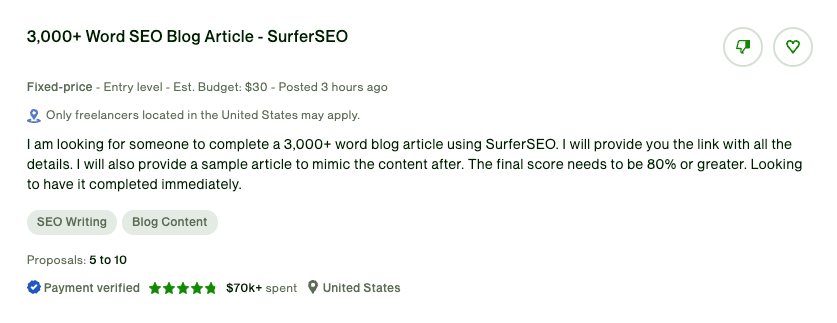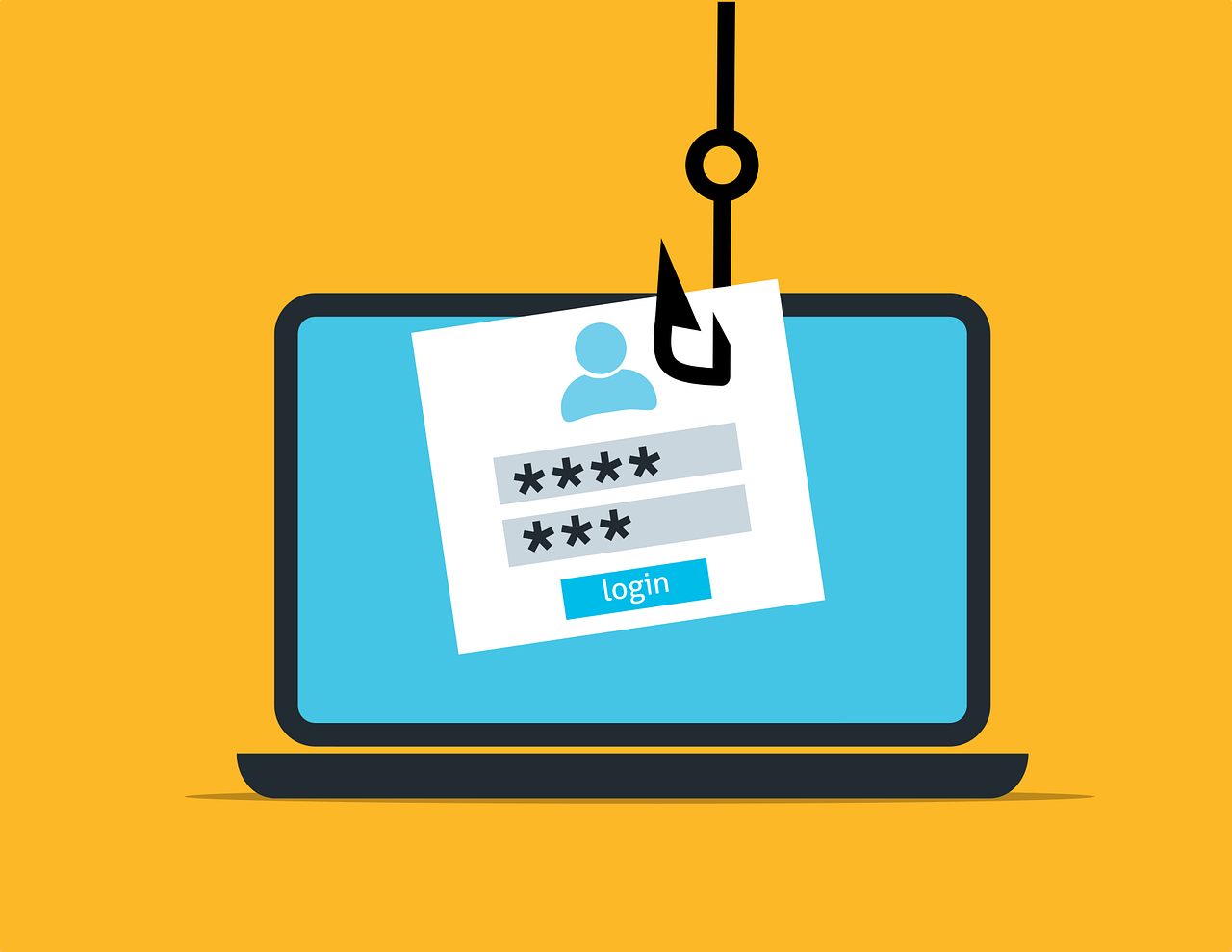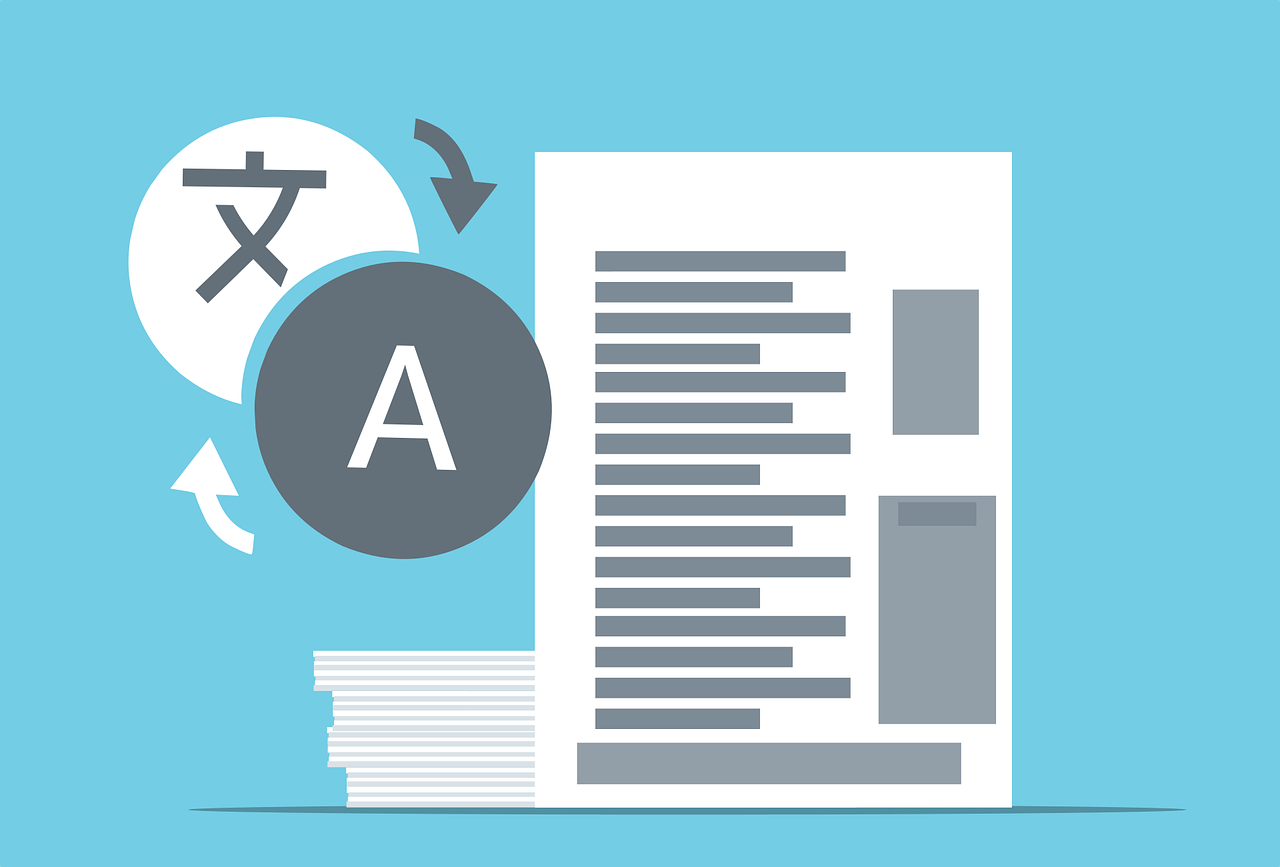Upwork Scams: 7 Tips To Help Avoid Them & Protect Yourself

When you buy something through one of the links on our site, we may earn an affiliate commission.
I started my freelance business on Upwork, so I know a thing or two about Upwork scams.
They're hard to spot. The offers seem like legitimate work, and since most people on Upwork are at the beginning of their careers, they're desperate for anything to get them started.
They don't know that those offers that seem too good to be true usually are.
However, Upwork can be a great place to start working online. I've made amazing connections that allowed me to meet other great clients — many of whom I wrote for a long time.
It's all about being able to spot the bad actors, which is a problem with every platform.
Do that, and your time on Upwork will be a lot better.
TOC
4 Things to Always Check To Avoid Upwork Scams
Speed is of the essence when you're trying to scan job postings. You must ensure that you get to the right listings before anybody else, giving yourself the best chance of getting noticed by the client.
With that in mind, there are a few things that you should check on every job description right off the bat.
Or, better yet, use the filters on the left-hand side of the page to filter out a few of these options first. That will make your search a lot quicker.
1. Verified Payment
The most important aspect of any job is knowing that the client will be able to pay you for your freelance work.
That's why Upwork has an amazing escrow service that holds the funds, which the client can only release once the job is complete.
That doesn't stop a lot of scammers from trying to work the system, though. Some of them will post a legitimate job offer, then ask for original work to be done — possibly on a "trial" basis — then ghost you once you submit the content.

What's far more common is that a job will be created with the payment listed as "not verified." That means the client doesn't have any legitimate financial information connected to their Upwork account. This, in turn, means that they have yet to pay for work they're trying to outsource on the platform.
There are a lot of reasons for this. For example, new clients may still need to set it up. Others may be testing the waters to see what kind of talent is out there before they go through the trouble of linking their card.
Regardless, it's a sign that the client is probably new to Upwork. While there's no harm in applying, it's always smart to insist that a legitimate payment method is in place before you actually start the job.
2. Hire Rate

A client's "hire rate" tells you how often the client will actually hire for the jobs that they post. A good hire rate usually hovers above 50%, but as with all postings, that's dependent on the situation.
You want a good hire rate because you want a reasonable chance that somebody will actually get the posted job. After all, why go through the trouble of crafting a great pitch and attaching relevant samples if the client will ignore it anyways?
Like with the "verified payment" scenario, there could be many reasons why somebody doesn't hire often on Upwork. If they only have a few jobs posted and the hire rate is low, that's one thing.
But it's best to look elsewhere if they have dozens posted with a hire rate of less than 10%. Chances are the client either isn't interested in hiring anybody or only looking to get free work.
Neither are worth your time.
3. Reviews
Reviews are the lifeblood of any Upwork account. They provide valuable social proof to potential customers regarding the quality of the goods or services they expect.
On Upwork, a client's review can be a valuable glimpse into what a working relationship with the client would be like.
Most freelancers and clients on Upwork get along great. As such, you'll almost always see positive reviews from other users. You rarely see anything less than two stars, only if the experience was just abysmal.

You primarily need to look for clients with 3 to 4 stars. That means the relationship was okay but presented some difficulties somewhere along the way.
If the freelancer left a written review, look for keywords that might tell the rest of the story. Things such as "difficult to work with" or "terrible communication" are dead giveaways.
When in doubt, follow your intuition. If you think it will be a difficult relationship, you don't even want to get started.
4. Budget
The general consensus around freelancing platforms like Upwork is that you generally won't receive fair market value for your efforts.
That's fine for most people. You're exchanging a higher rate that you could get elsewhere for the convenience of working on a single platform. Nothing wrong with that.
But an obscenely low budget for a project that you know takes significant skill and effort is an insult. Those should be avoided no matter the platform.
As a test, I just went on Upwork to pull a random sample of available jobs at the moment of this writing. Within minutes, I found someone looking for a web development company to build an 11-page site for $250.
Next was somebody wanting a digital graphics artist to create a video introduction for a course they were creating.
Their budget? $10.
And then there's this someone looking for a writer to clone an existing article. They want 3000 words and are willing to pay $30, which comes out to about a penny a word.

Suffice it to say; these are not acceptable rates.
But it's not just low budgets that you should be extra cautious of. Somebody posting a really high budget is usually just looking for attention.
Sometimes, they may be entirely serious and want to pay $12,000 for a 10,000-word e-book. Most of the time though, they just want you to click on their job posting.
How to Protect Yourself From Upwork Scams
Job freelancing platforms are like the wild west of the Internet. They're largely unsupervised and unregulated, so it's up to you to avoid scams.
Here are a few rules of thumb to follow.
1. Keep All Communication on Upwork
Never — and I mean never — communicate with the client outside of Upwork.
For starters, talking to a client, you met on the Upwork platform before starting the contract is explicitly against Upwork's terms and services. Once you start the contract, you're free to communicate however you like (even phone calls), but it's still wise to keep all your communication on the platform.
Why? Because all communication elsewhere isn't protected by Upwork. If you agree to the terms via email, Upwork will be able to verify that correspondence, and you'll be on your own.
Upwork clearly states in its terms and services that communicating off the platform significantly increases the risks of fraud and Upwork scams.
Unless you're reviewing content for the contract — such as a website or white paper — there isn't a need to communicate anywhere besides Upwork's messaging center, anyways. With both text and video capabilities, it's more expedient (and safer) to keep all communication on the Upwork platform, despite what the client says.

2. Always Accept Payment Through Upwork’s Escrow Service
Periodically, a client may offer to send you money outside of Upwork. If they do, this should immediately raise a few red flags.
There's no reason for a legitimate client utilizing Upwork's platform to not make payments through that platform. If they try and claim that Upwork won't accept their banking information, tell them to take it up with Upwork.
NEVER give a client any bank account details or personal info unless you want them to empty your pockets.
This point is so serious with Upwork that some clients and freelancers have gotten completely kicked off the Upwork platform for even mentioning it.
Yes, the 10% fee that Upwork takes for some projects seems high, but that's their cut for providing the connection in the first place. It's a small price to pay to protect yourself.
3. Be Wary of Third-Party Links

Due to the nature of online work, some clients will ask you to click a link to view documents or information pertinent to the job.
While this isn't always an Upwork scam, you should do your due diligence before clicking on any external link. Chances are it's fine, but it could also be a phishing link that's just trying to steal your information.
Your Upwork profile does allow space for links to your portfolio, but those are static links that aren't changed often. Suspicious links inside job proposals or messages are the ones to worry about.
If in doubt, take a closer look at the link itself. Upwork scammers generally use shortened links to mask the destination of the link. If it's a full link, you should piece together where it sending you from the URL.
Of course, you can always contact Upwork's trust and safety team to take a look at it. That's what they're there for, and are usually willing to help with things like this.
FAQ to Help Identify Upwork Scams
Despite the fact that there are some hard and fast rules that you should keep in mind when perusing Upwork, you also need some common sense. Often your gut will be the one that tells you it's time to run, instead of whether or not they meet a specific metric.
Below are a few questions you can ask yourself to understand better what you're about to walk into. Use your own judgment and make the best decision possible.

Is This Person Paying Too Little for the Expected Quality of Work?
Upwork provides prospective clients with three different experience levels they can request: expert, intermediate, or beginner.
Expert freelancers are well-versed in their specific tasks, while intermediate users have a certain level of experience. Beginners (obviously) are just getting started.
In a perfect world, a client's budget should reflect whatever experience level they're looking for. If they want an expert WordPress designer, they should be willing to spend more money on one.
Be careful with job postings where people are asking for the moon and yet only willing to pay pennies on the dollar. Conversely, if a potential client is paying an excessive amount for what they've labeled a beginner task, you should naturally be suspicious.
While it may be tempting to go after expert-level jobs while still a beginner, you should be honest about your experience. If a clients asks for expert-level work will demand expert-level work.
If you cannot provide it, your reviews will take a hit. Sometimes, the client may even feel the work is so unacceptable and won't pay for it.
Does the Job Briefing Give All Required Information?

Just because it's called a job "brief" doesn't mean it should be three words long.
Spend any amount of time on Upwork, and you'll notice a lot of postings with one or two sentences at most. Sometimes, they'll even be incomplete thoughts with no punctuation.
Those are definitely worth skipping over, but you should also examine a brief enough that you know what the client is asking for. If anything is unclear, mention it in your proposal (if you decide to submit one). That extra step will tell you more about the job and impress the client that you took the time to ask.
What is This Client’s Reputation Like On Upwork?
As mentioned above, the client's history will give you a good idea of what it's like to work with them.
To get a fair gauge of this, match the reviews from other freelancers (especially the written reviews) with their hire rate and budget. Does this person adequately understand the task they're hiring for? Did other people get along with them professionally and personally?
Answering these questions will help determine whether that client is worth your time.
Will There Be a Significant Language Barrier?
Freelance platforms are global by nature, so you'll most likely run into people worldwide.
This is normal for the client. It's very common to outsource certain jobs like developer work to other countries where the standard of living is lower. In that sense, dealing with a language barrier is just part of the job.

For a freelancer, a language barrier can present a significant obstacle. The more complex the job is, the more opportunities there are for misunderstandings.
While the language barrier shouldn't deter you from taking a job, you need to work extra hard to ensure you understand the assignment. Ask questions about anything you need help understanding fully, and be respectful. Those always go a long way with clients just looking for good, honest work to be completed.
Is the Client Promising “Opportunities” Instead of Fair Pay?
Telling a freelancer that completing a job will give you significant "exposure" is one of the oldest tricks in the book. It's also insulting if I do say so myself.
When people tell you this, they're really saying that they don't have the money to pay you for your work. Moreover, they don't think your work is worth being paid for. They most likely have an inflated sense of their brand, and think everybody else wants to be a part of it.
Unless the brand is extremely visible — and only you know what those brands are — you should always reject these offers. Even if the client tells you that doing this job will lead to future jobs, it should still reek of disrespect.
After all, what makes you think they will pay you for future jobs if they're not willing to pay you for this job?
Do I Have to Pay Anything To Complete the Job?
You should never work for free, just like you should never pay to work either.
Every once in a while, you'll come across a job posting where people will ask you to pay money upfront. Most times, this is for you to buy a product and then review it. Or they'll ask you to buy supplies to complete their task.
Be careful with these types of job postings. You may find out that doing these jobs leaves you with little to no profit afterward, which is a terrible position to find yourself in.
If a job requires you to purchase anything in advance, such as a book for review, work that price into the contract. Make sure that it's been added to the payout before you start.
Upwork Scams in Closing
As you can see, freelance websites have their pros and cons.
If you plan on using it as a freelancer, steer clear of anything that even looks like an Upwork scam. If you're able to do that, it's a relatively safe and profitable environment to work in. Over time, it may become your full-time job.
Want to learn step-by-step how I built my Niche Site Empire up to a full-time income?
Yes! I Love to Learn
Learn How I Built My Niche Site Empire to a Full-time Income
- How to Pick the Right Keywords at the START, and avoid the losers
- How to Scale and Outsource 90% of the Work, Allowing Your Empire to GROW Without You
- How to Build a Site That Gets REAL TRAFFIC FROM GOOGLE (every. single. day.)
- Subscribe to the Niche Pursuits Newsletter delivered with value 3X per week
My top recommendations

















